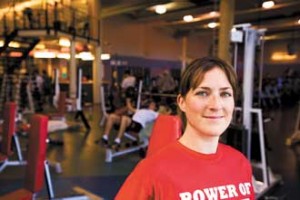
By Jim Hynes
For Cristina Pensato being an athletic therapist is about more than just taking care of sports injuries. It’s about treating the whole athlete. And that challenge, she says, is increasingly tied to nutrition.
“As an athletic therapist you travel with the teams, so you’re with the athletes for long periods of time. You’re not only the team therapist managing their injuries, but they also come to you with their problems, like when they are upset with their coach. They also come to you with hydration and nutrition questions.”
Pensato, a therapist at the McGill Sports Medicine Clinic who previously worked with the Montreal Impact soccer team, has put together a presentation on sports nutrition that she shares with
the McGill teams she has counselled, a list that includes the men’s and women’s soccer and basketball teams.
“With the whole ‘Atkins Revolution,’ athletes were a bit confused – and so was I to tell you the truth – about the whole debate over how much protein we should have and whether carbohydrates were as important as we thought. Athletes were coming to me with good questions, so I felt I had to clarify for myself exactly what athletes’ needs were in terms of nutrition and also to give them the
right information.”
Hitting the books and surfing the web, Pensato discovered that eating properly can affect everything from on-field performance to injury prevention. It turns out Pensato wasn’t the only one who needed a crash course. Most athletes and coaches, she says, still think nutrition is mostly about meeting caloric needs.
“But if you read more about it, it’s also to maintain a high performance level and for mental stamina. Sometimes when an athlete hasn’t had enough to eat, their thinking is affected. That’s when you start seeing mental errors committed, like missing an easy lay-up.”
One of the first things Pensato asks athletes is which of the macronutrients (protein, carbohydrates and fat) they think is most important.
“I was surprised to find that most of them thought it was protein. But the literature still says that carbs are the key macro-nutrient,” she said.
Pensato cites a study of soccer players and nutrition that showed the number of goals scored, mistakes made and injuries incurred all rising as the game clock ticked.
“They noticed that players who were depleted in carbs were more fatigued and ran out of energy in the second half,” Pensato said. “They made more mistakes and got injured more often, and this was largely associated with low carbohydrate levels.”
All of what Pensato has learned about sports nutrition won’t fit into this article. You’ll need to take in her presentation to even begin to scratch the surface of sports nutrition dos and don’ts, which cover everything from how many calories a day athletes should take in for the sport they play (it varies widely from sport to sport); eating right on a daily basis (lots of small, well-balanced meals); eating before the big game (a large meal three to four hours before, then increasingly small snacks up until game time and even at half-time); staying hydrated (and rehydrating); and the all-important post-exercise refuelling session (protein-carbohydrates combination in the 30 minutes that follow a strenuous workout plus a larger meal two hours later).
“When I tell athletes all of this and can back it up with studies and statistics, that’s when they wake up and see how much poor nutrition could hinder their performance. You really have to tie it to performance for athletes to respond.”
If your team needs a sports nutrition primer, contact Cristina Pensato at the McGill Sports Medicine Clinic,
514-398-7007, ext. 0.
